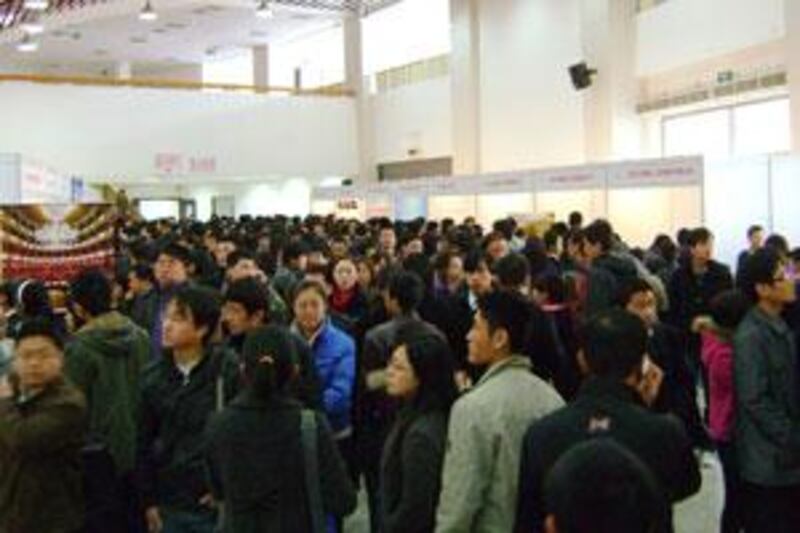BEIJING // It was standing room only at the Talents Job Fair held recently in the Chinese capital. Young men and women, some about to graduate, others with degrees, had to fight through a scrum of other job hopefuls to reach the stands of companies in fields as diverse as medicine, property and even karaoke television.
It was a stark reminder of the struggles facing graduates in the world's most populous country. According to many economists, the rapid expansion of China's higher education system means there are more people leaving China's universities than there are graduate-level jobs available to them. This does not need to be explained to Winter Wang, who graduated in industrial automation three years ago from Xi'an Economic University in Shaanxi province in central China. He earns 1,500 yuan (Dh807) a month as an application engineer and so has to live far out from the city centre, renting a single room in a traditional house for 400 yuan a month.
Areas on Beijing's outskirts, which through their low rents have attracted struggling graduates, have been labelled as "ant colonies", with young people packed into buildings divided up into small rooms. "I still cannot get suitable work," said Mr Wang, 28, who was at the job fair to find something better. "The situation is really tough; maybe I will go back to Xi'an. I went looking for a job in industrial automation, but the companies said I had no experience. It's a big problem."
The surplus of graduates partly stems from heavy increases in enrolment in higher education, introduced initially at a time of rising unemployment. In 1999, university enrolment jumped by 47 per cent in a single year to 1.6 million, and it continued to grow fast, reaching nearly five million in 2007. Last year, 6.1 million graduated from college, and the prime minister, Wen Jiabao, recently said in an online question-and-answer session that this year the number would reach a record 6.3 million.
Although factories have reported shortages of unskilled labour, there appears to be a shortage of graduate-level positions, even though official figures indicate that 87 per cent of last year's crop of university leavers found a job of some kind. "China's college system is too big," said Andy Xie, the former chief Asia economist for Morgan Stanley, the investment bank. "At this stage of economic development, it's not possible to employ so many college graduates. In the 1980s, there were 300,000 each year; now there are six million. The economy has not risen that much."
Perhaps it is no wonder that some, such as Su Xiaolei, 24, who studied at an agricultural college in Hebei province, are glad simply to have any job at all. He works at a travel agency and with his wife rents a room in a dilapidated courtyard house in central Beijing for 700 yuan a month. A dead rat lies in the path leading to the courtyard, where makeshift stoves have been set up because space is tight.
"Several years ago the situation was much better. People could find a job quite easily," he said. "Conditions are not so good, but after we've saved enough money we will consider moving to a nicer place. I am just a migrant worker and this suits me best." Jianmao Wang, a professor of economics at the China Europe International Business School in Shanghai, said subject choice was an important factor in employment prospects.
"We have continued to have more and more graduates for some years and there's a structural issue," he said. "Too many of them are in, for example, liberal arts and management, when what the country really needs is [graduates] in engineering. I think eventually the market will correct this." Mr Xie said that to improve their prospects, young people should gain technical skills at vocational colleges instead of taking academic subjects. Otherwise, he said, they would have to take jobs not traditionally carried out by someone with a degree.
"The college graduates will not accept this because they think, 'why did I go to school for four years for this?'" he said. Zhou Guanjun, who works in recruitment for a renewable energy company, Taimeixin, said graduates should temper their expectations and be prepared to start from a very low level . "Maybe they should get some work experience instead," he said. "There are so many graduates hunting for jobs. The new graduates should not be too optimistic about the situation. Maybe the chance will come by for them to get a better job" later.
Staying positive can be difficult. Xiao Yao, 24, admitted that he had found the time since he graduated in computer science from a university in Liaoning province in the country's north-east hard going. He has a temporary job as a property agent. "Morale has been hugely dampened," he said. "I was quite a good student back in school. The people who graduated in college have accumulated some esteem over the four years of study, but when they graduate it's so difficult. It makes you so discouraged. But I'm optimistic the situation will get better sooner or later."
@Email:dbardsley@thenational.ae






